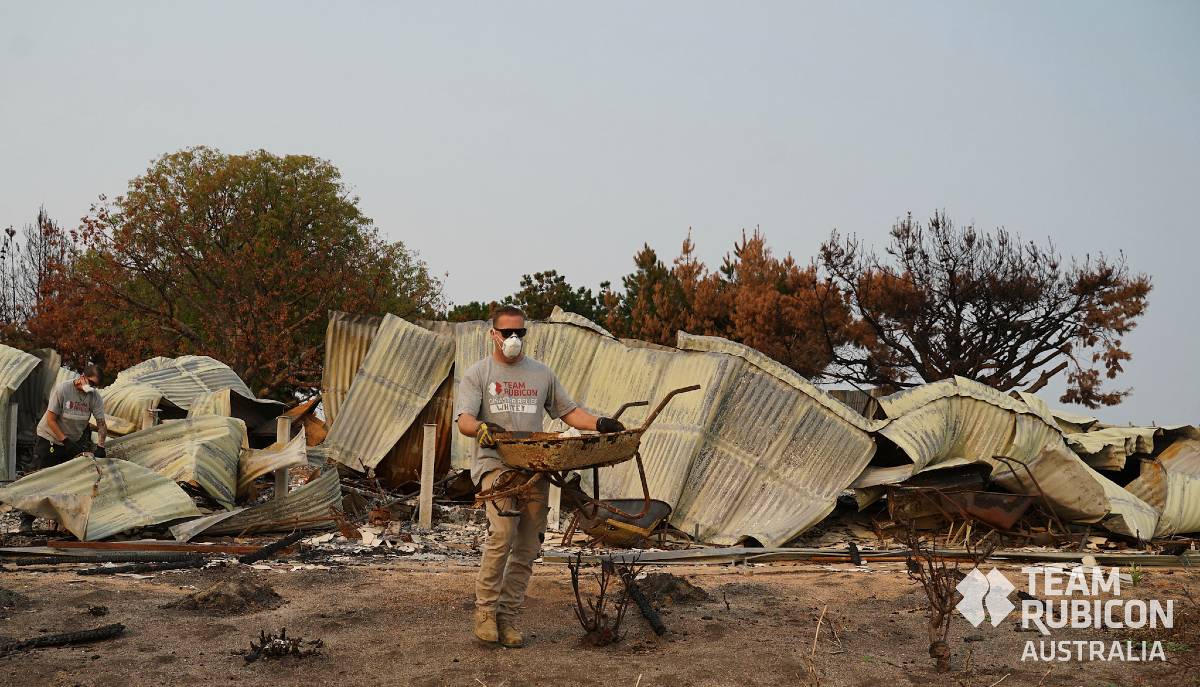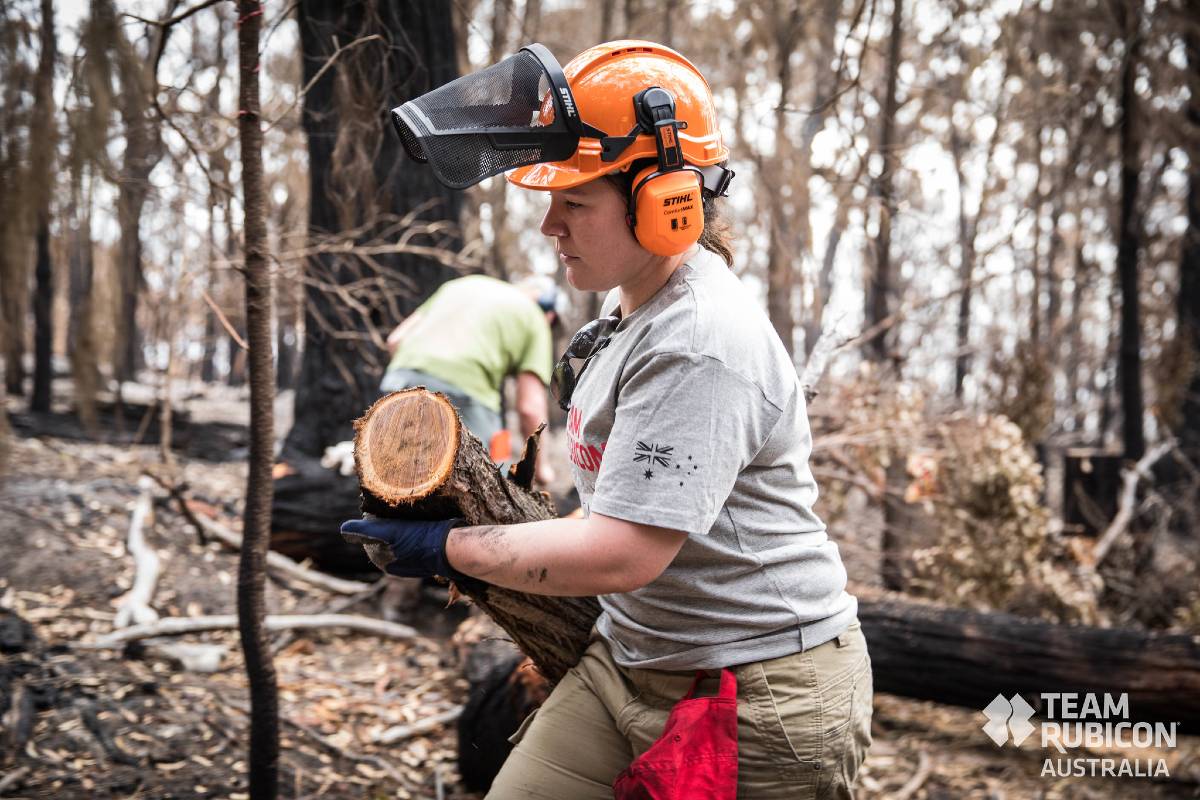Veterans doing what they do best
Team Rubicon Australia is helping redefine what it means to be a veteran.
Geoff Evans is a very determined man. As the Chief Executive Officer and cofounder of Team Rubicon Australia (TRA), he is committed to not only improving the mental health of veterans and supporting communities devastated by natural disasters, but redefining what it means to be a veteran.
Vetaffairs spoke to him and Anastasia Bougesis, TRA’s Director of Development, in mid-February when the organisation was working at capacity, with more than 3,000 volunteers operating throughout Australia, particularly in those areas ravaged by bushfires.
Geoff served in the Army for 20 years, including two tours of East Timor and two of Afghanistan where he was wounded. Medically discharged in 2010, he experienced an acute loss of purpose and identity. It is those things, according to Geoff and Anastasia, that TRA gives back to its volunteers, 85 per cent of whom are veterans, the rest being mostly first responders.
‘Mental health and suicide prevention are at the heart of everything we do, but we do that through service,’ says Geoff. ‘[Our volunteers] serve each other and serve the community.
‘A large part of what we’re trying to do is change the national narrative around what it means to be a veteran. Because if you say “veteran” in Australia, you think of an old man, or a young person in need of charity. You don’t think of a really smart young female naval warfare officer who’s running 50 veterans and up to 150 other volunteers on the ground in south-east NSW right now to deliver disaster relief to people who’ve lost everything.’
Since it was founded in 2017, TRA has conducted 22 disaster relief missions both in Australia and overseas. During the bushfires, it was operating in East Gippsland, south-east NSW, the Adelaide Hills and Kangaroo Island, as well as conducting a drought-relief mission across NSW.

Geoff and Anastasia point out that TRA’s virtue is that it achieves two mutually supporting objectives. The veterans who volunteer benefit from a huge boost in self-esteem and purpose from doing solid, meaningful work and in many cases getting skilled up for paid civilian employment. The communities they help also benefit enormously, not least because the volunteers, or ‘Greyshirts’, are so effective. Geoff puts this down to their military background.
‘Veterans have amazing skills and experience and when they leave the military, those skills are not utilised,’ he says. ‘[In establishing TRA], we saw an opportunity to put those skills and experience to work. In Australia, the emergency services and Army do a fantastic job, but once they withdraw there’s no one there in the recovery space. Now, when those organisations withdraw, they are handing over to us.
‘Veterans are ideally suited to working in the disaster relief environment because of their skills and experience. If you can operate in a war zone you can operate in a disaster zone.
‘We’re 40 per cent female, and if you think about the demographics of the military that’s a very high percentage. We attract young women in droves because we genuinely recognise their skills. We’re not concerned about your gender or what you did before you joined; it’s what you can contribute now. If you’ve got the skills, the ability and the time, we’ve got the opportunity.’
Anastasia is one such example. A part-time paramedic she also has a background in sales and marketing.
‘The drawcard for me was an organisation that recognises the skills you have and allows you to deploy on the ground without the bureaucracy you find in many other organisations, and to be able to give back to the community,’ she says.
When TRA arrives in a community, often one that is getting no assistance from anyone else, it provides such services as sifting through the ashes of destroyed houses looking for personal mementos, clearing fallen trees, cleaning up debris, fencing repairs, welfare assistance and staging community events.

They often accompany survivors when they return to what’s left of their house for the first time — obviously, an intensely distressing time for many people.
‘They are usually completely overwhelmed,’ says Geoff. ‘We work with them through the day, recovering their possessions, clearing off the block and usually, by the end of the day, they’re a different person. What we have actually done, is help them take the first step in their recovery. Once they have taken that first momentous step, they can take another, and another.’
TRA recognises that apart from familiarising volunteers with its procedures there’s not much they need to teach former military personnel.
‘We don’t waste time and money training people when the Australian Government has already spent millions of dollars training them,’ says Geoff.
Preparing its volunteers for paid employment and encouraging them to pursue it has made TRA a victim of its own success.
‘One of the biggest problems we have is people leaving our organisation,’ says Anastasia. ‘Not because they want to leave, but because we’ve built them up enough that they’re able to transition to paid employment. It’s a great problem to have.’
Geoff says the value veterans bring include highly developed leadership skills, initiative, resourcefulness, self-sufficiency and an inherent attitude of service above self.
‘They’re just such a remarkable workforce,’ he says. ‘It really upsets me that when industry and business think about hiring a veteran, they think they’re taking on a problem. It’s the opposite.’
TRA’s DVA-funded mental health training as well as the veterans’ own experience has led to some Greyshirts identifying suicidal people affected by the bushfires and successfully intervening. Volunteers have also stated that were it not for their involvement in TRA, they might well have suicided themselves.
The Government has provided $15 million to TRA, Soldier On and the RSL to roll out employment-related programs through a one-off grants package. Geoff is grateful for the support, and for DVA’s funding of TRA’s expansion program so they could respond to the Cudlee Creek bushfire.
‘We work very closely with DVA and they’ve been amazing. When these fires were happening, we had DVA ringing us saying: in all the areas you’re working in, if you find a veteran who’s been affected, ring us straight away. All stops were pulled out.’
TRA’s immediate plans are to recruit new volunteers and expand the number of disaster relief teams around Australia. They are also working with businessman Andrew Forrest’s charity the Minderoo Foundation to become part of a national framework for better managing what are known as ‘spontaneous volunteers’ (volunteers who arrive unsolicited at disaster sites to help), in cooperation with the corporate sector.
For more information, visit TRA’s website.
